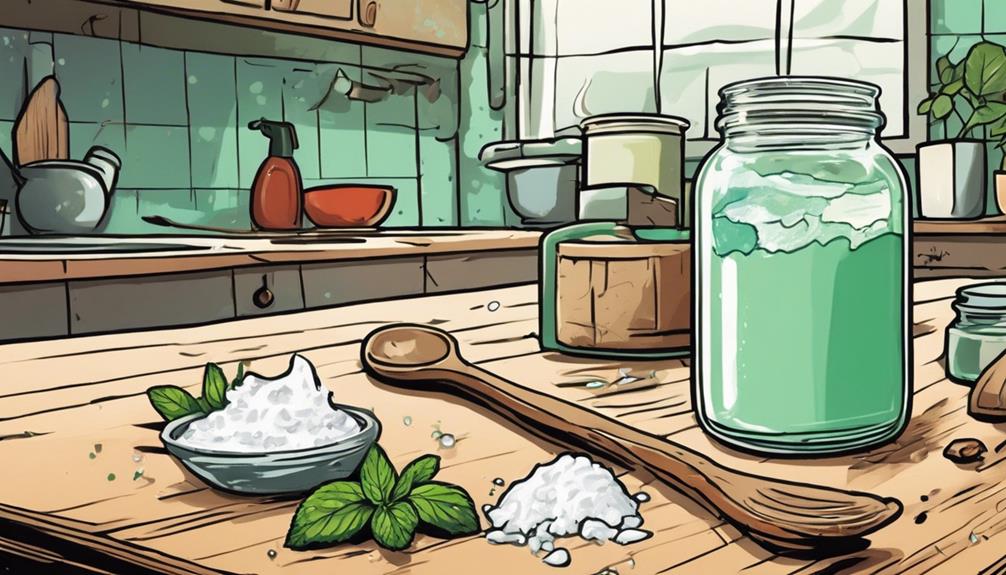You can easily make your own natural toothpaste at home with just a few ingredients. Start by mixing 1/2 cup of coconut oil and 4 tablespoons of baking soda until smooth. Add 15 drops of peppermint essential oil for flavor and antibacterial properties. This recipe not only helps whiten teeth but also promotes gum health. Store your homemade toothpaste in an airtight jar to keep it fresh. Feel free to customize it by adding bentonite clay or experimenting with different essential oils. If you want to discover more tips for enhancing your toothpaste, there's plenty more to learn! If you’re interested in how to make toothpaste for kids, you can easily modify this recipe by using a lower concentration of essential oils and choosing a milder flavor that kids will enjoy. You can also add a small amount of xylitol for a sweet taste without the harmful effects of sugar. Making toothpaste at home allows you to have control over the ingredients and ensure that it’s safe and effective for the whole family. With a few simple adjustments, you can create a toothpaste that kids will love to use.
Key Takeaways
- Combine 1/2 cup of coconut oil with 4 tablespoons of baking soda for a smooth paste base.
- Add 15 drops of peppermint essential oil for flavor and antibacterial properties.
- Incorporate bentonite clay for detoxifying and remineralizing effects, if desired.
- Store the mixture in an airtight jar to maintain freshness and prevent contamination.
Historical Context of Toothpaste
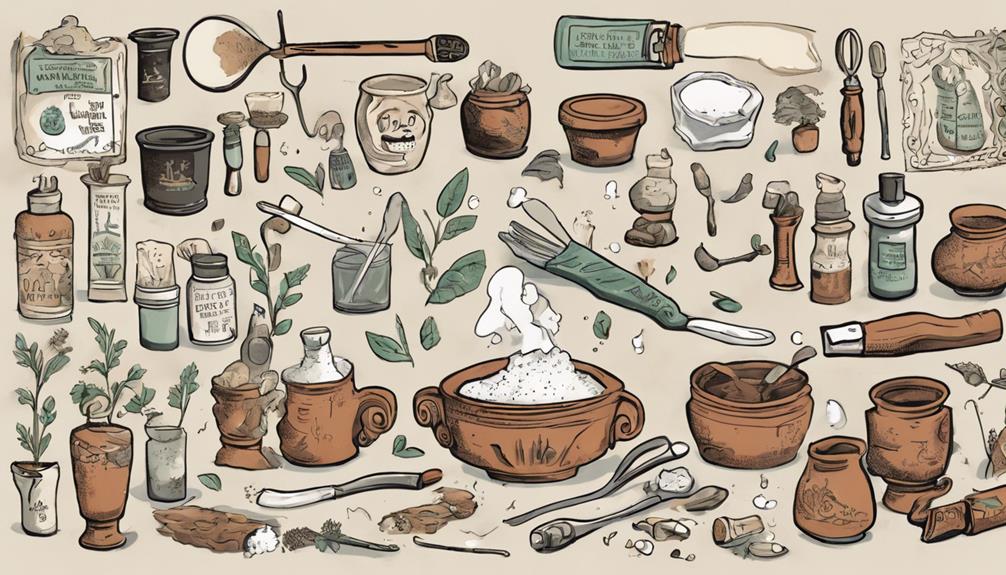
Toothpaste has a rich history that dates back to ancient Egypt, where early formulas combined ashes from burnt oxen hooves and eggshells with pumice for effective debris removal. These ancient mixtures aimed primarily at maintaining oral health and cleaning teeth, rather than addressing tooth decay in the way modern toothpaste does.
Over centuries, the purpose and composition of toothpaste evolved considerably. By the 20th century, the introduction of fluoride marked a crucial change in the fight against tooth decay. Fluoride's proven ability to strengthen tooth enamel and prevent cavities transformed toothpaste into an essential tool for oral health.
Today, toothpaste isn't just about cleaning; it's also about prevention and therapy. Modern formulations often include ingredients specifically designed to combat plaque and promote gum health, highlighting the increasing awareness of how oral health impacts overall well-being.
You mightn't think about it often, but every time you squeeze that tube, you're using a product that has been refined through thousands of years of history. Understanding this context can enhance your appreciation for the toothpaste you use daily and its role in maintaining your smile.
Key Ingredients in Homemade Toothpaste
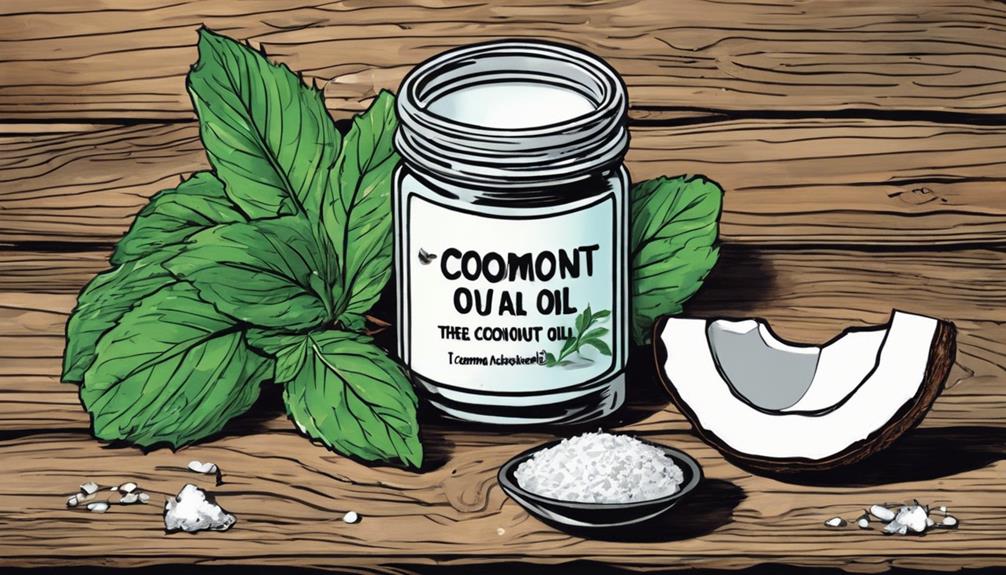
When making homemade toothpaste, choosing the right ingredients is essential for achieving effective oral care and a pleasant experience. Here are some key components you might consider:
| Ingredient | Benefits | Usage |
|---|---|---|
| Coconut Oil | Acts as a natural antibacterial agent and reduces inflammation in the gums. | Use as a base. |
| Baking Soda | Provides mild abrasiveness to remove plaque and whitens teeth without harming enamel. | Mix for texture. |
| Essential Oils | Enhances flavor and adds antibacterial properties for fresh breath. | Add a few drops. |
Coconut oil serves as a fantastic base due to its antibacterial qualities, helping to keep your gums healthy. Baking soda is another must-have; it not only whitens your teeth but also neutralizes pH levels in your mouth. Finally, essential oils, like peppermint or clove oil, can elevate your toothpaste's flavor while promoting overall oral health. By balancing these ingredients, you can create a toothpaste that's not only effective but also enjoyable to use.
Benefits of Natural Ingredients
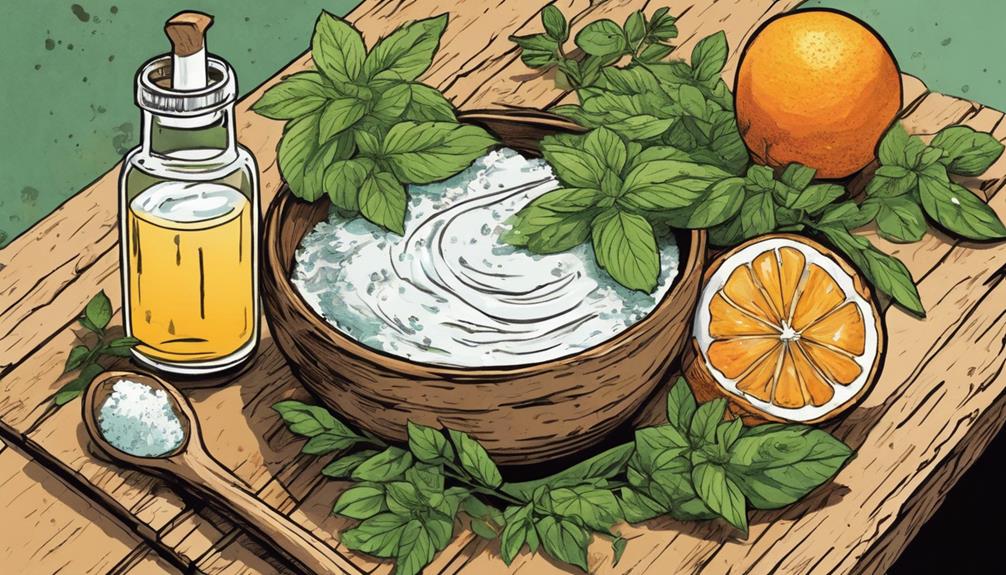
Natural ingredients in homemade toothpaste offer a range of benefits, making your oral care routine healthier and more effective. When you choose natural toothpaste, you're opting for ingredients that promote better oral health.
For instance, coconut oil has antibacterial properties that combat harmful bacteria, helping to maintain a cleaner mouth. Baking soda is another key ingredient, serving as a gentle abrasive that aids in plaque removal and whitens your teeth without the harsh effects of commercial products.
Essential oils, like peppermint, not only provide an invigorating flavor but also possess antimicrobial properties that reduce bad breath and support gum health. Incorporating ingredients such as bentonite clay can further enhance your oral care by detoxifying and remineralizing your teeth, leading to stronger enamel and a lower risk of cavities.
One of the biggest advantages of using homemade toothpaste is the absence of toxic additives, like fluoride and sodium lauryl sulfate. This minimizes health risks while protecting the integrity of your oral microbiome, allowing you to enjoy a natural and effective approach to dental hygiene.
Preparation Steps for Homemade Toothpaste
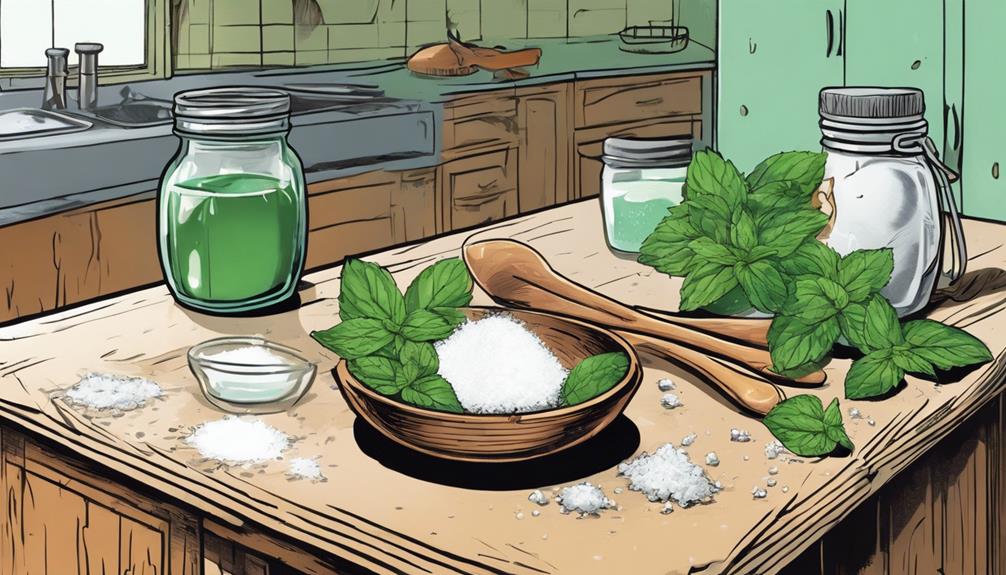
Making your own toothpaste is a simple process that allows you to harness the benefits of natural ingredients while ensuring you know exactly what goes into your oral care routine.
Unlike commercial toothpaste brands, you can customize your formula to suit your preferences.
Here's how to prepare your homemade toothpaste:
- Start with 1/2 cup of room temperature coconut oil as your base.
- Add 4 tablespoons of baking soda, which acts as a gentle abrasive for effective plaque removal.
- Include 15 drops of peppermint essential oil for flavor and its antibacterial properties.
- Mix everything thoroughly until you achieve a smooth and soft paste consistency.
This simple recipe lets you make your own natural toothpaste that's free from harsh chemicals.
Plus, you can easily adjust the essential oil to create your favorite flavors.
With just a few easy steps, you'll have a revitalizing, effective alternative to store-bought options, ensuring your oral hygiene routine is both effective and enjoyable!
Storage Recommendations
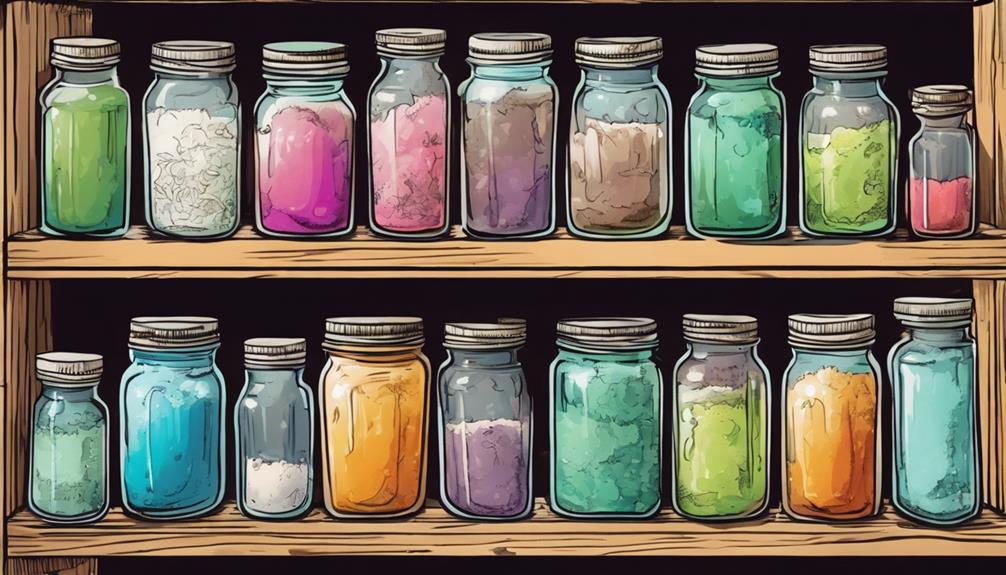
To keep your homemade toothpaste fresh and effective, store it in an airtight jar to prevent moisture and air exposure. This is one of the best storage recommendations to maintain its quality.
For convenience, you can keep a small portion in the jar for immediate use while storing the bulk in a sealed container. This way, you prolong the shelf life of your homemade toothpaste.
Using BPA-free silicone tubes is another great option for easy dispensing. These tubes not only make application hassle-free but also help avoid harmful chemicals that may leach into your toothpaste.
Homemade toothpaste typically lasts for a few weeks, so it's important to monitor it for any changes in texture or smell. If you notice anything unusual, it's best to discard it.
While refrigeration isn't necessary, keeping the toothpaste in a cool, dry place can help maintain its consistency and effectiveness over time.
Following these storage recommendations will guarantee you enjoy your homemade toothpaste to its fullest, keeping your oral care routine both effective and safe.
Safety Considerations

When making your own toothpaste, you need to be aware of the safety of your ingredients.
Always use food-grade components and store your mixture properly to prevent spoilage.
Ingredient Safety Awareness
Ingredient safety is essential for guaranteeing your homemade toothpaste is both effective and gentle on your oral health. When crafting your own toothpaste, it's vital to prioritize ingredient safety awareness to avoid toxic ingredients that could harm you. Here are some key considerations to keep in mind:
Use safe, natural ingredients: Stick to items like coconut oil and baking soda, which are effective and safe for oral use.
Be cautious with essential oils: These can enhance flavor and offer antibacterial benefits, but remember to use them sparingly to avoid any harmful effects.
Avoid glycerin: While it's considered safe, glycerin might interfere with the remineralization process of your enamel.
Monitor for reactions: Pay attention to how your mouth feels after using your homemade toothpaste. Everyone's sensitivity varies, so you might need to adjust your recipe.
Check for freshness: Natural ingredients can spoil, so regularly assess the texture and smell of your toothpaste to guarantee it remains safe and effective.
Proper Storage Practices
Storing your homemade toothpaste in an airtight container is essential for maintaining its freshness and preventing contamination. You can use a BPA-free silicone tube or a mason jar for effective storage. Keeping your toothpaste at room temperature is critical, especially if it contains coconut oil, which can solidify and cause plumbing issues if used in that state.
Regularly check your toothpaste for any changes in texture, smell, or color. These alterations might indicate spoilage, and it's best to dispose of the product if you notice anything unusual. When scooping out your toothpaste, always use a clean utensil. This practice helps avoid introducing bacteria and prolongs the shelf life of your homemade toothpaste.
If you find that your toothpaste is spoiling quickly, consider refrigerating it. Cooler temperatures can help maintain its quality for a more extended period. Proper storage practices are fundamental for ensuring that your homemade toothpaste remains safe and effective.
Common Ingredients to Avoid

When making your own toothpaste, it's essential to avoid harmful ingredients that could damage your health or teeth.
Common culprits like glycerin, saccharin, and fluoride can pose serious risks, so you should steer clear of them.
Instead, focus on safe alternatives that maintain oral hygiene without the downsides.
Harmful Chemicals to Avoid
Many common toothpaste ingredients can be harmful, so it's essential to know which ones to avoid for your oral health. By steering clear of these harmful chemicals, you can protect your mouth and overall well-being.
Here's a list of ingredients to watch out for:
- Sodium lauryl sulfate (SLS): This foaming agent can irritate your oral mucosa and disrupt the balance of oral microbes.
- Triclosan: Banned in many countries, this chemical disrupts hormones and may contribute to antibiotic resistance.
- Propylene glycol: Found in antifreeze, this ingredient can cause skin irritation and systemic toxicity over time.
- Artificial flavorings and colors: These synthetic additives can lead to inflammation and hormonal imbalance.
Safe Alternatives for Toothpaste
To create a safe and effective homemade toothpaste, focus on using natural ingredients while avoiding common harmful additives.
You'll want to steer clear of ingredients like sodium lauryl sulfate (SLS), which can cause canker sores and alter your taste perception, resulting in an unpleasant brushing experience.
Glycerin is another ingredient to avoid, even though it's generally considered safe; it may hinder your enamel's remineralization process.
Saccharin also poses a risk, as it's linked to potential carcinogenic properties. You should limit fluoride in your toothpaste, too, since it can be toxic in large amounts and increase the risk of overdose, especially in kids.
Additionally, triclosan isn't a safe alternative for oral care products either, as it's associated with antibiotic resistance and endocrine disruption.
These ingredients can't only affect your dental health but also contribute to issues like bad breath.
Customizing Your Toothpaste Recipe
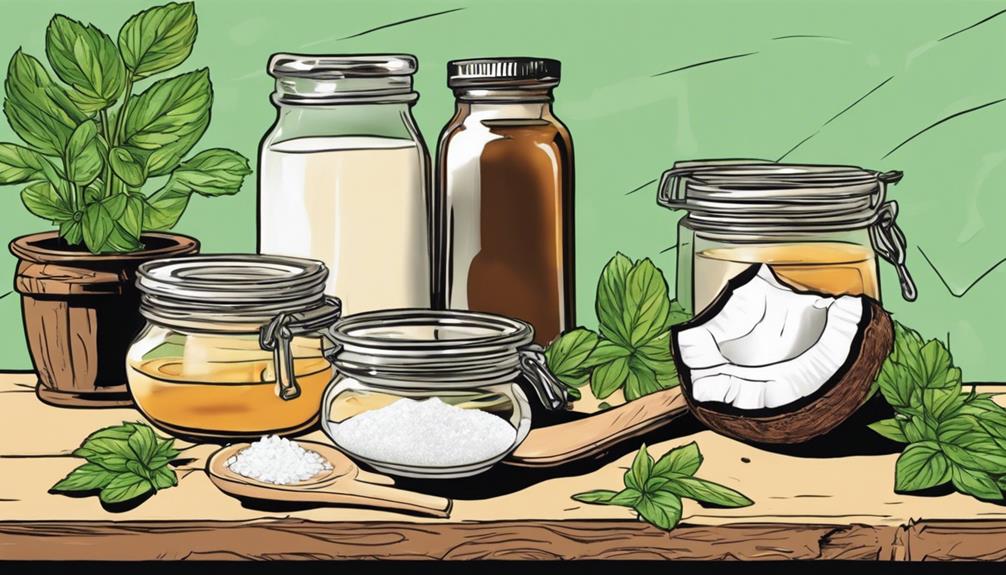
Customizing your toothpaste recipe lets you create a blend that perfectly suits your preferences and oral health needs. You can easily adjust ingredients to make a homemade (natural) toothpaste that aligns with your goals.
Here are some tips to help you customize your recipe:
- Adjust the coconut oil and baking soda ratio to achieve your desired consistency and abrasiveness.
- Experiment with essential oils like peppermint for an invigorating taste or clove for its antibacterial properties.
- Add bentonite clay for detoxifying and remineralizing effects, boosting your oral health.
- Incorporate activated charcoal for extra whitening power, but be cautious to use it sparingly to protect your enamel.
Alternative Oral Care Options
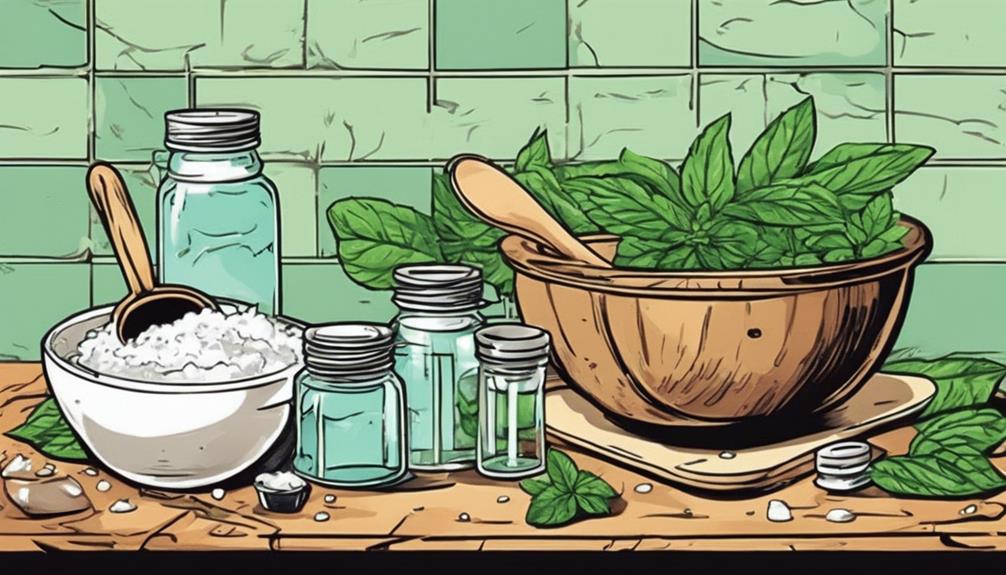
When you explore alternative oral care options, you'll find that natural ingredients offer amazing benefits for your teeth and gums.
Preparing your own toothpaste is simple, and you can easily customize flavors to suit your taste.
This approach not only promotes oral health but also keeps harmful additives at bay.
Natural Ingredients Benefits
Natural ingredients in homemade toothpaste offer a host of benefits that enhance oral health while avoiding harmful additives commonly found in commercial products. By choosing natural ingredients, you're not only promoting a healthier mouth but also steering clear of substances like fluoride and sodium lauryl sulfate that can disrupt your oral microbiome.
Here are some key benefits of using natural ingredients in your homemade toothpaste:
- Coconut oil: Known for its antibacterial and anti-inflammatory properties, it helps reduce harmful bacteria in your mouth.
- Baking soda: Acts as a gentle abrasive and neutralizes acids, helping to maintain a healthier saliva pH and lower cavity risk.
- Essential oils: Options like peppermint and clove add invigorating flavor and provide additional antibacterial effects.
- Antimicrobial properties: Together, these natural ingredients work to effectively remove plaque without the harshness of commercial products.
Simple Preparation Process
Making your own toothpaste is surprisingly easy and requires just a few simple ingredients.
To make toothpaste at home, start with 1/2 cup of room temperature coconut oil. This natural base isn't only effective but also gentle on your teeth. Next, add 4 tablespoons of baking soda, which helps to whiten and clean your teeth.
To enhance the flavor and boost antibacterial properties, incorporate 15 drops of peppermint essential oil. Mix all the ingredients until a soft paste forms. Once you've achieved the right consistency, transfer your homemade toothpaste into an airtight jar for storage. Keeping it at room temperature will maintain its freshness, but be sure to check for any changes in texture or smell over time.
When you're ready to use it, simply scoop out 1/2 teaspoon of the paste onto your toothbrush. Brush your teeth for 2 minutes, twice daily, to enjoy effective oral hygiene.
This homemade toothpaste not only avoids harmful ingredients often found in commercial products but also promotes a healthier oral microbiome, making it a fantastic alternative for your dental care routine.
Customizable Flavor Options
You can easily customize your homemade toothpaste with various flavor options to suit your taste and enhance its oral health benefits. By incorporating essential oils and natural sweeteners, you can create an invigorating experience that also offers antibacterial properties.
Here are some flavor options to take into account:
- Peppermint essential oil: A classic choice that provides a cool, invigorating taste while fighting bacteria.
- Clove essential oil: Known for its warm flavor and strong antibacterial properties, it's great for oral health.
- Cinnamon essential oil: Adds a sweet and spicy kick, plus it helps combat oral bacteria.
- Natural sweeteners like stevia or xylitol: These can improve your toothpaste's taste and have cavity-fighting benefits.
Adjust the amounts of essential oils or natural sweeteners to personalize your toothpaste experience. By doing so, you'll not only enjoy brushing your teeth more but also boost your oral hygiene regime with delightful flavors!
Additional Resources and References

Exploring various online platforms can lead you to detailed recipes and ingredient lists for homemade toothpaste tailored to specific dental needs. Websites dedicated to DIY health often provide insights into creating effective whitening toothpaste or formulas for sensitive teeth. The American Dental Association's resources are invaluable; they outline safe ingredients to evaluate in your homemade (natural) mixtures.
Numerous DIY blogs discuss both the benefits and potential side effects of using natural ingredients. This information helps you make informed decisions about what to include in your toothpaste. For example, while baking soda offers whitening properties, excessive use may lead to enamel erosion.
Additionally, educational materials emphasize the importance of oral health, highlighting how natural alternatives can avoid harmful additives found in conventional toothpaste.
Community forums and social media groups are also great resources, where you can share experiences and get tips from others who've successfully made their own toothpaste. These platforms create a supportive environment for exchanging knowledge and strategies, ultimately empowering you to maintain oral health while exploring homemade options tailored to your needs.
Frequently Asked Questions
What Is the Best Homemade Toothpaste?
The best homemade toothpaste combines natural ingredients like coconut oil, baking soda, and essential oils. This blend effectively cleans your teeth, freshens your breath, and can even enhance your oral health with optional additives.
How Do You Make 100% Natural Toothpaste?
When it comes to making 100% natural toothpaste, you can't judge a book by its cover. Mix coconut oil, baking soda, and peppermint oil to create a fresh, effective paste that promotes oral health naturally.
Is It OK to Make Your Own Toothpaste?
Yes, it's okay to make your own toothpaste! You can control the ingredients and avoid harmful additives. Just guarantee you choose safe, effective components to maintain your oral health without compromising safety.
Is It Cheaper to Make Your Own Toothpaste?
Yes, it's cheaper to make your own toothpaste. With costs around $2 to $5 for several months' supply, you save considerably compared to commercial options, which can range from $3 to $10 per tube.
Is Homemade Toothpaste as Effective as Charcoal Toothpaste?
Many people wonder about the truth about charcoal toothpaste and if homemade toothpaste can match its effectiveness. While homemade toothpaste can be a natural alternative, studies suggest that charcoal toothpaste may offer superior whitening and stain removal benefits. It’s important to weigh the pros and cons before making a decision.
Conclusion
Making your own toothpaste can be a fun and rewarding experience!
By using natural ingredients, you not only take control of what goes into your mouth but also reduce exposure to harmful chemicals.
Have you ever thought about how your toothpaste choices impact your health?
With a few simple steps, you can create a personalized formula that suits your needs.
So why not give it a try and enjoy the benefits of a fresher, more natural approach to oral care?
